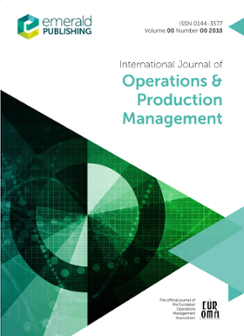Performance improvements in logistics outsourcing relationships: the role of LSP and customer organizational culture archetypes
IF 7.4
2区 管理学
Q1 MANAGEMENT
International Journal of Operations & Production Management
Pub Date : 2021-11-18
DOI:10.1108/ijopm-02-2021-0122
引用次数: 3
Abstract
PurposeThe study aims to develop an organizational culture typology and explore how different logistics service provider (LSP) and customer archetypes interact to generate performance improvements in logistics outsourcing relationships.Design/methodology/approachA multiple case study approach with 12 dyads was employed. Interviews as well as public and internal data from LSPs and customers were analyzed.FindingsThe results reveal four archetypes each for LSPs and customers, characterized by two dimensions: “activeness” and “openness”. Furthermore, analyzing the interaction among the archetypes, three relationship patterns are identified (“static”, “restrained”, and “progressive”) that differ in the exploratory and exploitative improvement outcomes.Research limitations/implicationsThe study contributes to theory development at the intersection of organizational culture and logistics outsourcing.Originality/valueThe study provides a typology of organizational culture in logistics outsourcing and how different archetypes interact to generate improvements.物流外包关系中的绩效改进:LSP和客户组织文化原型的作用
目的本研究旨在建立一种组织文化类型,并探索不同的物流服务提供商(LSP)和客户原型如何相互作用,以提高物流外包关系的绩效。设计/方法/方法采用12对的多案例研究方法。对访谈以及LSP和客户的公开和内部数据进行了分析。研究结果揭示了LSP和客户的四个原型,分别具有“主动性”和“开放性”两个维度。此外,通过分析原型之间的互动,确定了三种关系模式(“静态”、“约束”和“渐进”),它们在探索性和开发性改进结果方面有所不同。研究局限性/含义本研究有助于组织文化和物流外包交叉点的理论发展。原创性/价值本研究提供了物流外包中组织文化的类型学,以及不同原型如何相互作用以产生改进。
本文章由计算机程序翻译,如有差异,请以英文原文为准。
求助全文
约1分钟内获得全文
求助全文
来源期刊
CiteScore
13.30
自引率
17.20%
发文量
96
期刊介绍:
The mission of the International Journal of Operations & Production Management (IJOPM) is to publish cutting-edge, innovative research with the potential to significantly advance the field of Operations and Supply Chain Management, both in theory and practice. Drawing on experiences from manufacturing and service sectors, in both private and public contexts, the journal has earned widespread respect in this complex and increasingly vital area of business management.
Methodologically, IJOPM encompasses a broad spectrum of empirically-based inquiry using suitable research frameworks, as long as they offer generic insights of substantial value to operations and supply chain management. While the journal does not categorically exclude specific empirical methodologies, it does not accept purely mathematical modeling pieces. Regardless of the chosen mode of inquiry or methods employed, the key criteria are appropriateness of methodology, clarity in the study's execution, and rigor in the application of methods. It's important to note that any contribution should explicitly contribute to theory. The journal actively encourages the use of mixed methods where appropriate and valuable for generating research insights.

 求助内容:
求助内容: 应助结果提醒方式:
应助结果提醒方式:


